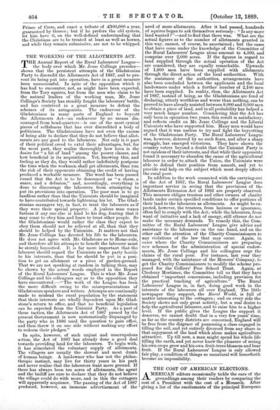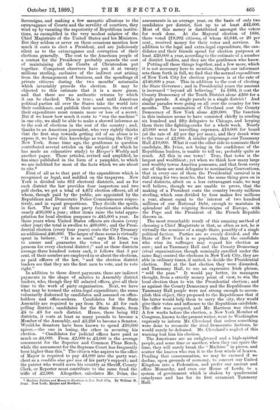THE COST OF AMERICAN ELECTIONS.
AMERICAN editors occasionally tickle the ears of the groundhogs among their readers by comparing the cost of a President with the cost of a Monarch. After giving a list of the emoluments of the principal European Sovereigns, and making a few sarcastic allusions to the extravagance of Courts and the servility of courtiers, they wind up by vaunting the superiority of Republican institu- tions, as exemplified in the very modest salaries of the Chief Magistrate of the United States and his Ministers. But they seldom or never on these occasions mention how much it costs to elect a President, and are judiciously silent as to the extravagance and corruption of their elections generally. The cost to the American people of a contest for the Presidency probably exceeds the cost of maintaining all the Courts of Christendom put together. Competent observers have put it at twenty millions sterling, exclusive of the indirect cost arising from the derangement of business, and the spendings of private citizens during the two months' saturnalia which invariably precede the election. It may be objected to this estimate that it is a mere guess, and that there are no authentic returns by which it can be checked. This is true ; and until American political parties all over the States take the world into their confidence, and publish their accounts, the extent of their expenditure must remain more or less of a secret. But if we know how much it costs to "run the machine" in one city, we shall be able to make a shrewd inference as to the cost of elections in the rest of the country ; and, thanks to an American journalist, who very rightly thinks that the first step towards getting rid of an abuse is to expose it, we have this knowledge as touching the City of New York. Some time ago, the gentleman in question contributed several articles on the subject (of which he has made an exhaustive study) to Harper's Weekly and another paper. These articles, revised and amplified, he has since published in the form of a pamphlet, to which we are indebted for most of the facts which we are about to cite.* First of all as to that part of the expenditure which is recognised as legal, and saddled on the taxpayers. New York is divided into- 812 electoral districts, and as for each district the law provides four inspectors and two poll clerks, we get a total of 4,872 election officers, all of whom, though paid by the public, are appointed by the Republican and Democratic Police Commissioners respec- tively, and in equal proportions. They divide the spoils, in fact. The pay of these party functionaries absorbs nearly 430,000 a year ; other items raise the total appro- priation for local election purposes to 445,000 a year. In those years when 'United States officers are chosen (every other year) the total is swollen to £60,000; and the Presi- dential election (every four years) costs the City Treasury an additional 440,000. The larger of these sums is virtually spent in bribery. "It is so used," says Mr. Ivins, "as to assure and guarantee the votes of at least ten persons for every electoral district ;" and as these districts average three hundred voters each, it follows that 3 per cent. of their number are employed in or about the elections, as paid officers of the law, "and the election district leaders see that they are the first men to vote, and to vote right."
In addition to these direct payments, there are indirect payments in the shape of salaries to Assembly district leaders, who, though they fill salaried offices, give all their time to the work of party organisation. Next, we have what may be termed the extra-legal expenditure, the sums voluntarily disbursed by candidates and assessed on office- holders and office-seekers. Candidates for the State Assembly are required to pay from 20s. to 4,3 for each polling district ; candidates for the State Senate, from 44 to 46 for each district. Hence, there being 812 districts, it costs at least as many pounds to become a Member of the Assembly, and 43:248 to become a Senator. Would-be Senators have been known to spend 410,000 apiece,—the one in losing, the other in securing his election. "Candidates for judicial offices have paid as much as 44,000. From 42,000 to 43,000 is the average assessment for the Superior and Common Pleas Bench, while the assessment for the Supreme Court has frequently been higher than this." The citizen who aspires to the office of Mayor is required to pay 44,000 into the party war- chest as a conditio sine qua non of his party's support; and the patriot who would serve his country as Sheriff, County Clerk, or Reporter must contribute to the same fund the trifle of 42,000. Altogether, calculates Mr. Ivins, the
• Mackin° Polities and Money in Elections in New York City. By William M. Ivins. New York 1 Harper and Brothers.
assessments in an average year, on the basis of only two candidates per district, foot up to at least 442,000. Most of this money is distributed amongst the voters for work done. At the Mayoral election of 1886, there voted 219,992 citizens, of whom 43,848, or 20 per cent., received money for their votes and services. In addition to the legal and extra-legal expenditure, the can- didates and their friends spend for election purposes at least 420,000 a year, according to the estimate of a number of district leaders, and they are the gentlemen who know. Putting all these things together, and a few more, which it is not necessary here to mention, though our informant sets them forth in full, we find that the normal expenditure of New York City for election purposes is at the rate of 4140,000 a year. This in addition to the cost of electing the State Governor • and in Presidential years the amount is increased "beyond all believing." In 1884, it cost the County Democracy of the Tenth District alone 4260 for a single parade. A single parade in a single district ! And similar parades were going on all over the country for two months. The nomination of Cleveland cost the County Democracy of New York alone 420,000. The function in this instance seems to have consisted chiefly in sending six hundred and fifty delegates to Chicago, and keeping them there like fighting-cocks for a whole week. Nearly 43,000 went for travelling expenses, 410,000 for board (at the rate of 42 per day per man), and they drank wine to the tune of 42,000. A similar pilgrimage cost Tammany Hall 410,000. What it cost the other side to nominate their candidate, Mr. Ivins, not being in the confidence of the Republican leaders, is unable to tell us ; probably quite as much. All this in one town ! True, that town is the largest and wealthiest ; yet when we think how many large and wealthy towns America possesses, and. that from every one of them are sent delegates to nominating Conventions, that in every one of them the Presidential carnival is in full swing for two months, that the same thing goes on in rural districts, albeit on a less extravagant scale, we may well believe, though we are unable to prove, that the making of a President costs the country twenty millions sterling, which sum divided by four makes five millions a year, almost equal to the interest of two hundred millions of our National Debt, enough to maintain in splendour all the reigning Sovereigns of Europe, with the Pope and the President of the French Republic thrown in.
The most remarkable result of this amazing method of choosing a Chief Magistrate is that, as often as not, he is virtually the nominee of a single State, possibly of a single political faction. Parties are so evenly divided, and the State of New York is so populous, that the candidate who wins its suffrages may regard his election as sure ; and as Tammany Hall and the County Democracy (rival organisations, though norninmlly enrolled under the same flag) control the elections in New York City, they are able in ordinary times, if united, to decide the Presidential election. But at the last election they were disunited, and Tammany Hall, to use an expressive Irish phrase, "sold the pass." It would pay better, its managers thought, from a strictly money point of view, to win the local election than to win the Presidential election ; and as against the County Democracy and the Republicans the Tammany Hall people were not strong enough to accom- plish this object, they proposed to the Republicans that if the latter would help them to carry the city, they would give their votes and influence to the Republican candidate. The offer was accepted, and Mr. Harrison was elected. A few weeks before the election, a New York Member of Congress, known to the present writer, went to Washington expressly to inform Mr. Cleveland that unless something were done to reconcile the rival Democratic factions, he would surely be defeated. Mr. Cleveland's neglect of this warning lost him his election. The Americans are an enlightened and a high-spirited people, and some time or another, when they can spare the time, they will surely break the " Machine ' in pieces, and scatter the knaves who run it to the four winds of heaven. Pending that consummation, we may be excused if we decline, upon grounds of economy, to convert our United Kingdom into a Federation, and prefer our ancient and effete Monarchy, and even our House of Lords, to a system of government which is shaken by quadrennial cataclysms and has for its first ornament Tammany Hall.



















































 Previous page
Previous page